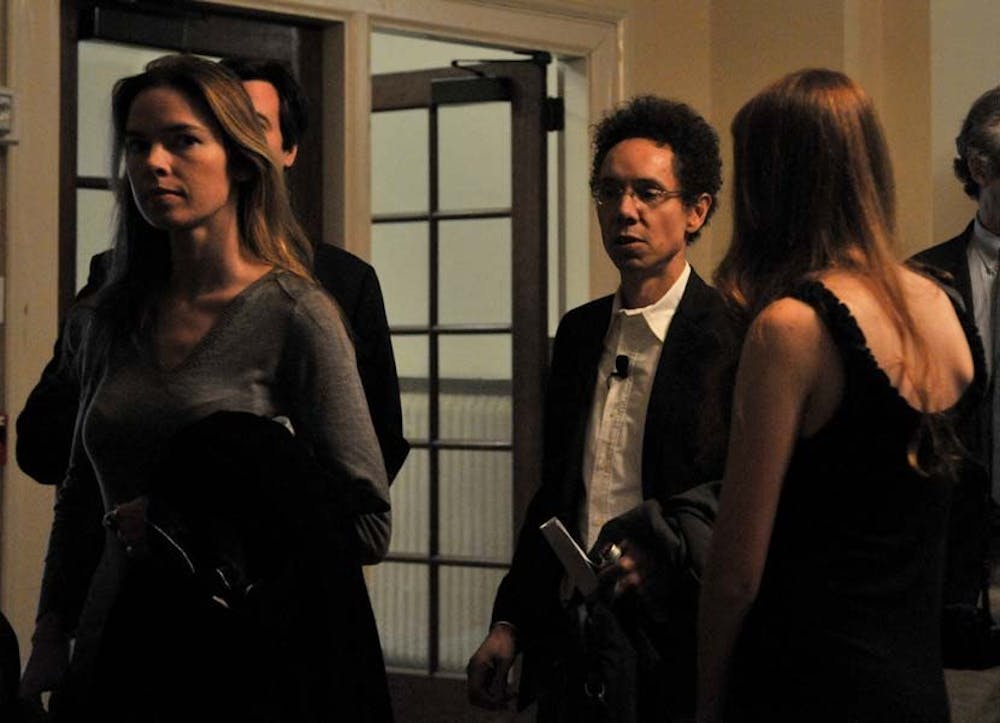Malcolm Gladwell — the British-Canadian journalist and author of The New York Times bestsellers “The Tipping Point,” “Blink” and “Outliers” — raised a controversy and a trail of questions Thursday night after his lecture at the Harrison Auditorium in the Penn Museum.
As a public intellectual, Gladwell lectured on the topic of “thinking” — which is the Benjamin Franklin Scholars Integrated Studies Program theme this semester.
The talk was part of the University’s “Year of Proof” speaker series, and on this theme, Gladwell provoked contentious debate when his subject turned to something close to the hearts of many — football.
Introduced by Dean of the School of Arts and Sciences Rebecca Bushnell and Director of BFS Peter Struck, Gladwell began by reminiscing on his talk at Penn three years ago. On that occasion, he spoke about how universities should teach students how to drink properly. This reflection helped set the tone for the rest of Thursday night’s lecture.
“What level of proof do we need about the harmfulness of some activities before we act?” Gladwell asked. Supplying the intuitive answer, Gladwell explained that usually, we ask for evidence. And that is perfectly fine, he added, as it would be improper to act in the absence of evidence.
But that would raise a second question, he said: are there instances where we ask for too much evidence before acting?
According to Gladwell, the request for “proof” sometimes turns into an excuse for inaction, leaving people suffering when they shouldn’t be.
He illustrated this through an early 20th-century study by statistician Frederick Hoffman. The study investigated miners dying of black lung disease due to overexposure to coal dust. The findings were largely ignored due to private interest groups and a “lack of evidence” from such a small-scale, informal study. It was not until 1975, however, that working conditions finally ameliorated.
Related
A member of the football team’s response to Gladwell’s talk
9/14/10: Owen Thomas brain autopsy reveals disease
4/28/10: Student death confirmed a suicide
In Gladwell’s view, people are no more empathetic or enlightened than they were a century ago. And that, he said in a surprising narrative twist, is manifest through the nation’s obsession with football, especially at the college level.
Gladwell outlined the risks involved in playing football — in one season, he said, players sustain 1,000 blows to the head on average, excluding concussions or more severe injuries. This amount of damage is conducive to the development of a disorder known as chronic traumatic encephalopathy — a degenerative neurological disease that eventually leads to dementia and death.
The disease is not anything new, and the list of suicides attributed to CTE is only growing.
In fact, Owen Thomas — the late Wharton student and varsity football player — is on that list. Although he did not have a history of depression, Thomas committed suicide as a junior in 2010. The autopsy revealed that he too was a victim of CTE.
This, Gladwell suggested, calls for action. He suggested that Penn students boycott football games as a way to protest what he called a “violent, stupid game” that serves only entertainment purposes.
Wharton senior and football player John Onwualu felt that Gladwell’s claims were disrespectful, a sentiment echoed by other football players present. In particular, Onwualu was “disappointed that a speaker would come to the University and suggest that the University did not appropriately handle the death of Owen Thomas, or that he brought up someone’s death as a way to bolster his point.”
He added that “the way [Gladwell] expressed his opinions was inappropriate and disrespectful for a speech like that.”
Other students unaffiliated with the football team found Gladwell provocative as well, but agreed with the author’s general opinion.
College of Liberal and Professional Studies student Zach Winston said, “You have to be provocative [sometimes].”



